Table of Contents

With the flu and virus season in full effect across the country, many people have been turning to natural supplements to help strengthen their immune system. One of the most popular and powerful antiviral herbs is turmeric curcumin. Studies have demonstrated that turmeric can improve the immune system, fight infections, and reduce inflammation.1
The popularity has led to hundreds of turmeric supplements flooding the marketplace. While these supplements all promise to deliver benefits, the reality is that many fall short. Some of the most popular brands use ineffective or insufficient doses of ingredients, and many contain low-quality fillers.
This short guide will help you know what to look for and what to avoid so you can make an informed decision when it comes to your turmeric curcumin supplement needs. We will also list out the top 5 turmeric supplements sold today.
Let’s take a moment to understand precisely how turmeric curcumin supplements work to improve your whole-body health and why it’s essential to add it to your daily routine.
What is a Virus?
A virus, also known as a pathogen, is a small infectious agent that can cause the flu, common cold, and many other diseases.2 When someone who is infected coughs, small virus particles are projected into the air, where you may unwittingly inhale the virus. It only takes a small number of virus particles to infect you.
As the virus enters your body, it invades your healthy cells, using them to create many copies of the virus. This viral invasion can destroy or alter the healthy cells, causing you to be sick. Not all strains of viruses attack in the same way, with some impacting your respiratory system and others your blood or liver.3
Understanding The Immune System
The immune system is made up of white blood cells, proteins, and organs that work as a team to defend the body from any invading viruses and bacteria.10 As a virus enters the body and begins to hijack health cells, it causes inflammation, which alerts the immune system to a pathogenic invasion. The immune system deploys all its resources to search for and destroy the virus. It also works to fight against any of your body’s cells, which have been altered due to the infection.11
If your immune system is performing optimally, then it can fight off a virus, allowing you to avoid getting sick. Other times, your immune system may be weak, allowing it to be overrun by a viral invasion, and it can take longer for it to beat the virus. Unfortunately, antibiotics have no impact on viral infection, and most treatments only help with the symptoms, which is why having a robust immune system is vital to your health.
4 Things To AVOID
When Buying A Turmeric Supplement
The Food and Drug Administration (FDA) lists turmeric curcumin as Generally Recognized as Safe (GRAS). Some issues have been reported with lower quality Turmeric supplements or those that contain a lot of potentially harmful fillers and additives.
1. Harmful Contaminants
Yellow Food Coloring – In countries where turmeric is very popular, such as India, some manufacturers use the food colorant metanil yellow (acid yellow 36) to enhance the color of Turmeric. If consumed in high amounts, metanil yellow has been shown in animal studies to cause a wide range of diseases. While metanil yellow is banned in the US, it is vital to avoid any turmeric with food coloring.15
Lead – Turmeric is often grown throughout South Asia and Bangladesh, India is considered a major source for this beneficial spice. However, a recent Stanford-led study indicated that some turmeric originating from Bangladesh was contaminated with a lead-based chemical compound.16
Additional studies have revealed that turmeric was the cause of high levels of lead in the blood of children in Bangladesh.17, 18 Lead is a neurotoxin that can damage the heart, brain, and kidneys.19 Look for a turmeric curcumin supplement that has been third-party tested to ensure it is contaminant free.
2. Not Backed By A Doctor
Creating an effective turmeric curcumin supplement requires a solid understanding of which ingredients to use and in what level of potency. Avoid a brand which is not supported by a credible doctor.
3. Insufficient Return Policy
A reputable turmeric curcumin supplement brand will demonstrate they have faith in their product by offering a 100% money-back guarantee policy. Some try to complicate their refund policies by placing limitations on what kind of returns they will take. Avoid any brand that does not have at minimum a no questions asked 90-day money-back guarantee.
4. Relying on Amazon Reviews
Research showed that in March 2019, there were 1.8 million new unverified reviews, with an average of 99.6% of them being 5-star reviews.32 Most of these reviews are from people paid to write them. These fake reviews inflate the number and overall star rating of a product. When deciding on a product that can impact your health, don’t rely on Amazon reviews as they can be extremely misleading.

2023’s Top Five Turmeric Curcumin Supplements
Our review encompassed 82 different turmeric curcumin supplements, putting each through our rigorous ReviewScout assessment process. To determine 2023’s Top 5 Turmeric Curcumin Supplements, we look for predicted effectiveness, supporting studies, safety, pricing, return policy, and overall customer satisfaction.
#1 Stonehenge Health Dynamic Turmeric
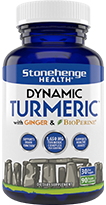
A+
Overall Grade
#1 Stonehenge Health Dynamic Turmeric
-
OVERALL RATING
9.6/10
-
Predicted Effectiveness
9.6/10
-
Ingredient Quality
9.7/10
-
Value
9.4/10
-
Return Policy
9.8/10
-
User Rating
9.5/10
Pros
- 1,650mg of Turmeric Curcumin Complex with standardized 95% curcuminoids
- 300 mg Organic Ginger Root Extract
- 15 mg of BioPerine®
- Endorsed by a Doctor
- Vegetarian Capsules, Non-GMO, Vegan, Gluten and Soy Free, No artificial ingredients or fillers
- Verified 90-day 100% money-back return policy
Cons
- Often out of stock due to high demand
Why We Chose It
Stonehenge Health’s Turmeric Curcumin is Review Scout’s top choice. This formula contains a
potent dose of 1,650 mg of Turmeric Curcumin with standardized 95% curcuminoids.
We were impressed that this brand included 300 mg of Ginger to aid in digestive comfort and
15 mg of BioPerine® to improve curcumin absorption.
We were able to verify that Stonehenge Health’s formula does not contain any synthetic fillers
or artificial ingredients and is vegan and non-GMO. It is also one of just a few brands we found
to be endorsed by a Doctor.
Stonehenge Health backs its products with a no-questions-asked, 90-day money-back guarantee. We also like
that they offer customers discounts on bundles. Click on the link below to see their current
specials.
*Results are based on user-generated experiences with these products, and individual results
may vary. Please refer to the manufacturer’s product website for detailed information.
#2 Youtheory Turmeric
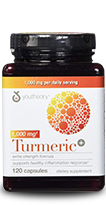
A-
Overall Grade
#2 Youtheory Turmeric
-
OVERALL RATING
8.4/10
-
Predicted Effectiveness
9.1/10
-
Ingredient Quality
8.6/10
-
Value
8.5/10
-
Return Policy
7.5/10
-
User Rating
8.4/10
Pros
- 1,000 mg of Turmeric Curcumin C3 Complex with standardized 95% curcuminoids
- 10 mg of BioPerine®
- Vegetarian Capsules
- Dairy, Soy, and Gluten-Free
Cons
- Lower than an optimal amount of Turmeric
- Does not contain Ginger
- Consumer complaints of digestive discomfort
- Return Policy Limited To Point of Purchase
- Not endorsed by an MD
Why We Chose It
Youtheory Turmeric Extra Strength is a popular brand that provides 1,000 mg per serving of
turmeric standardized to 95% curcumin using C3 Reduct®. This form of turmeric is said to
enhance the bioavailability, but there are insufficient studies to make a precise determination.
The product does contain 10 mg of BioPerine® to aid in the absorption. When comparing to the
top-ranked brand on our list, Youthery’s amount of turmeric and BioPerine® included falls a bit
short. Also, there is no inclusion of Ginger in this Tumeric formula, which could account for
some of Youthery’s user complaints related to digestive discomfort. Youtheory does not offer
any product guarantee or return policy on their website.
*Results are based on user-generated experiences with these products, and individual results
may vary. Please refer to the manufacturer’s product website for detailed information.
#3 Doctor’s Best Curcumin
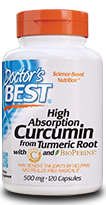
B+
Overall Grade
#3 Doctor’s Best Curcumin
-
OVERALL RATING
8.3/10
-
Predicted Effectiveness
8.6/10
-
Ingredient Quality
8.2/10
-
Value
8.7/10
-
Return Policy
7.5/10
-
User Rating
8.7/10
Pros
- 1,000 mg of Turmeric Curcumin C3 Complex standardized 95% curcuminoids
- 6 mg of BioPerine®
- Non-GMO, Soy and Gluten-Free
Cons
- Lower than the optimal amount of Turmeric
- Does not contain Ginger
- Not Vegetarian Safe
- Return Policy Limited To Point of Purchase
Why We Chose It
Doctor’s Best provides 1,000 mg per serving of Turmeric standardized to 95% curcumin using C3
Complex. The product contains a lower than optimal amount of Turmeric. While the formula
does include BioPerine® to aid absorption, it is just 6 mg per serving. Doctor’s Best also chose
not to include Ginger in their formula. Doctor’s Best Turmeric is made with gelatin capsules
making it not appropriate for vegetarians or other health-conscious consumers. The brand does
not have a consumer return policy listed on its website. If you buy a Doctor’s Best product, you
are limited to the retailer’s return policy, typically just 30-days.
*Results are based on user-generated experiences with these products, and individual results
may vary. Please refer to the manufacturer’s product website for detailed information.
#4 Qunol
Extra Strength Turmeric
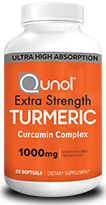
C
Overall Grade
#4 Qunol Extra Strength Turmeric
-
OVERALL RATING
8.1/10
-
Predicted Effectiveness
7.2/10
-
Ingredient Quality
7.3/10
-
Value
8.9/10
-
Return Policy
8.4/10
-
User Rating
8.9/10
Pros
- 1,000 mg of Bioenhanced Turmeric Complex
- Endorsed by a Doctor
- Dairy, Wheat, and Soy-Free
Cons
- Gelatin Softgels made from bovine (beef)
- Does not include Ginger Root Extract
- Does not contain BioPerine®
- Limited 30-day return policy
Why We Chose It
Qunol’s Extra Strength Turmeric contains 1000 mg of Turmeric, which the brand claims to be bio-
enhanced with water dispersion technology for superior absorption. While Qunol references a study
conducted showing it to have superior absorption over BioPerine®, more independent studies need to
be undertaken to support this claim further. This formula does not include any Ginger Root Extract to
aid in digestion. Qunol uses gelatin softgels made from bovine (beef), making it not appropriate for
vegetarians or other health-conscious consumers.
*Results are based on user-generated experiences with these products, and individual results
may vary. Please refer to the manufacturer’s product website for detailed information.
#5 Garden of Life
Turmeric Gummy
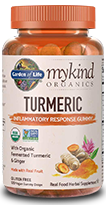
C-
Overall Grade
#5 Garden of Life Turmeric Gummy
-
OVERALL RATING
7.6/10
-
Predicted Effectiveness
6.2/10
-
Ingredient Quality
9/10
-
Value
6.6/10
-
Return Policy
8.5/10
-
User Rating
7.8/10
Pros
- 254 mg of Certified Organic Turmeric Blend in Gummy Form
- 50 mg of Organic Fermented Ginger Root
Cons
- Contains 7 grams of sugar per serving
- Limited 30-day Return Policy
Why We Chose It
Garden of Life mykind Organics is capitalizing on the popularity of gummy vitamins with their turmeric
supplement. While these gummies have garnered positive reviews for being tasty, they pack 7 grams of
sugar per serving, which may not be appropriate for those watching their blood sugar levels or other
health-conscious consumers. It is good to see certified organic turmeric in this formula, but the dosage
offered per serving is very low at only 254 mg per serving. Similarly, we were pleased to see they
included ginger, but at only 50 mg per serving, it is considerably less than the top-rated brand on our
list. Garden of Life backs their product with a very limited 30-day refund period.
*Results are based on user-generated experiences with these products, and individual results
may vary. Please refer to the manufacturer’s product website for detailed information.
Citations
- Zorofchian Moghadamtousi, Soheil, Habsah Abdul Kadir, Pouya Hassandarvish, Hassan Tajik, Sazaly Abubakar, and Keivan Zandi. 2014. “A Review On Antibacterial, Antiviral, And Antifungal Activity Of Curcumin”. Biomed Research International 2014: 1-12. doi:10.1155/2014/186864.
- Lodish, Harvey, Arnold Berk, S Zipursky, Paul Matsudaira, David Baltimore, and James Darnell. 2000. “Viruses: Structure, Function, And Uses”. W. H. Freeman. https://www.ncbi.nlm.nih.gov/books/NBK21523/.
- Carrington, James C., and Steven A. Whitham. 1998. “Viral Invasion And Host Defense: Strategies And Counter-Strategies”. Current Opinion In Plant Biology 1 (4): 336-341. doi:10.1016/1369-5266(88)80056-6.
- “Psychological Stress And Cancer”. 2012. National Cancer Institute. https://www.cancer.gov/about-cancer/coping/feelings/stress-fact-sheet.
- “Can Lack Of Sleep Make You Sick?”. 2020. Mayo Clinic. https://www.mayoclinic.org/diseases-conditions/insomnia/expert-answers/lack-of-sleep/faq-20057757.
- Sussan, Thomas E., Sachin Gajghate, Rajesh K. Thimmulappa, Jinfang Ma, Jung-Hyun Kim, Kuladeep Sudini, and Nicola Consolini et al. 2015. “Exposure To Electronic Cigarettes Impairs Pulmonary Anti-Bacterial And Anti-Viral Defenses In A Mouse Model”. PLOS ONE 10 (2): e0116861. doi:10.1371/journal.pone.0116861.
- Dipak Sarkar, H. Joe Wang. 2015. “Alcohol And The Immune System”. Alcohol Research : Current Reviews 37 (2): 153. https://www.ncbi.nlm.nih.gov/pmc/articles/PMC4590612/.
- Myles, Ian A. 2014. “Fast Food Fever: Reviewing The Impacts Of The Western Diet On Immunity”. Nutrition Journal 13 (1). doi:10.1186/1475-2891-13-61.
- Allison, Matthew A., Nicole E. Jensky, Simon J. Marshall, Alain G. Bertoni, and Mary Cushman. 2012. “Sedentary Behavior And Adiposity-Associated Inflammation”. American Journal Of Preventive Medicine 42 (1): 8-13. doi:10.1016/j.amepre.2011.09.023.
- B, Parkin. 2020. “An Overview Of The Immune System. – Pubmed – NCBI “. Ncbi.Nlm.Nih.Gov. https://www.ncbi.nlm.nih.gov/pubmed/11403834.
- Nicholson, Lindsay B. 2016. “The Immune System”. Essays In Biochemistry 60 (3): 275-301. doi:10.1042/ebc20160017.
- Chen, Da-Yuan, Jui-Hung Shien, Laurence Tiley, Shyan-Song Chiou, Sheng-Yang Wang, Tien-Jye Chang, Ya-Jane Lee, Kun-Wei Chan, and Wei-Li Hsu. 2010. “Curcumin Inhibits Influenza Virus Infection And Haemagglutination Activity”. Food Chemistry 119 (4): 1346-1351. doi:10.1016/j.foodchem.2009.09.011.
- Xu, Yiming, and Ling Liu. 2017. “Curcumin Alleviates Macrophage Activation And Lung Inflammation Induced By Influenza Virus Infection Through Inhibiting The NF-Κb Signaling Pathway”. Influenza And Other Respiratory Viruses 11 (5): 457-463. doi:10.1111/irv.12459.
- Han S, et al. 2020. “Curcumin Ameliorates Severe Influenza Pneumonia Via Attenuating Lung Injury And Regulating Macrophage Cytokines Production. – Pubmed – NCBI “. Ncbi.Nlm.Nih.Gov. https://www.ncbi.nlm.nih.gov/pubmed/28853207.
- “Curcumin May Help Overcome Drug-Resistant Tuberculosis”. 2020. Sciencedaily. https://www.sciencedaily.com/releases/2016/03/160325093704.htm.
- Adapala, Nagasuresh, and Marion M Chan. 2008. “Long-Term Use Of An Antiinflammatory, Curcumin, Suppressed Type 1 Immunity And Exacerbated Visceral Leishmaniasis In A Chronic Experimental Model”. Laboratory Investigation 88 (12): 1329-1339. doi:10.1038/labinvest.2008.90.
- N, Chainani-Wu. 2020. “Safety And Anti-Inflammatory Activity Of Curcumin: A Component Of Tumeric (Curcuma Longa). – Pubmed – NCBI “. Ncbi.Nlm.Nih.Gov. https://www.ncbi.nlm.nih.gov/pubmed/12676044.
- Aggarwal, Bharat B., and Kuzhuvelil B. Harikumar. 2009. “Potential Therapeutic Effects Of Curcumin, The Anti-Inflammatory Agent, Against Neurodegenerative, Cardiovascular, Pulmonary, Metabolic, Autoimmune And Neoplastic Diseases”. The International Journal Of Biochemistry & Cell Biology 41 (1): 40-59. doi:10.1016/j.biocel.2008.06.010.
- “Inflammation In Atherosclerosis. – Pubmed – NCBI “. 2020. Ncbi.Nlm.Nih.Gov. https://www.ncbi.nlm.nih.gov/pubmed/12490960.
- Bode, Ann, and Zigang Dong. 2011. “The Amazing And Mighty Ginger”. CRC Press/Taylor & Francis. https://www.ncbi.nlm.nih.gov/books/NBK92775/.
- Qorbanpour, Mehdi, Taha Fahim, Faramin Javandel, Mehran Nosrati, Erwin Paz, Alireza Seidavi, Marco Ragni, Vito Laudadio, and Vincenzo Tufarelli. 2018. “Effect Of Dietary Ginger (Zingiber Officinale Roscoe) And Multi-Strain Probiotic On Growth And Carcass Traits, Blood Biochemistry, Immune Responses And Intestinal Microflora In Broiler Chickens”. Animals 8 (7): 117. doi:10.3390/ani8070117.
- Ji, Kaihua, Lianying Fang, Hui Zhao, Qing Li, Yang Shi, Chang Xu, Yan Wang, Liqing Du, Jinhan Wang, and Qiang Liu. 2017. “Ginger Oleoresin Alleviated Γ-Ray Irradiation-Induced Reactive Oxygen Species Via The Nrf2 Protective Response In Human Mesenchymal Stem Cells”. Oxidative Medicine And Cellular Longevity 2017: 1-12. doi:10.1155/2017/1480294.
- Townsend, Elizabeth A., Matthew E. Siviski, Yi Zhang, Carrie Xu, Bhupinder Hoonjan, and Charles W. Emala. 2013. “Effects Of Ginger And Its Constituents On Airway Smooth Muscle Relaxation And Calcium Regulation”. American Journal Of Respiratory Cell And Molecular Biology 48 (2): 157-163. doi:10.1165/rcmb.2012-0231oc.
- Naderi, Zahra, Hassan Mozaffari-Khosravi, Ali Dehghan, Azadeh Nadjarzadeh, and Hassan Fallah Huseini. 2016. “Effect Of Ginger Powder Supplementation On Nitric Oxide And C-Reactive Protein In Elderly Knee Osteoarthritis Patients: A 12-Week Double-Blind Randomized Placebo-Controlled Clinical Trial”. Journal Of Traditional And Complementary Medicine 6 (3): 199-203. Elsevier BV. doi:10.1016/j.jtcme.2014.12.007.
- 2020. Free-Journal.Umm.Ac.Id. http://free-journal.umm.ac.id/files/file/002_12764ns1101_7_15.pdf.
- Ernst, E, and M H Pittler. 2000. “Efficacy Of Ginger For Nausea And Vomiting: A Systematic Review Of Randomized Clinical Trials”. British Journal Of Anaesthesia 84 (3): 367-371. Elsevier BV. doi:10.1093/oxfordjournals.bja.a013442.
- Ghayur, Muhammad Nabeel, and Anwarul Hassan Gilani. 2005. “Pharmacological Basis For The Medicinal Use Of Ginger In Gastrointestinal Disorders”. Digestive Diseases And Sciences 50 (10): 1889-1897. Springer Science and Business Media LLC. doi:10.1007/s10620-005-2957-2.
- “Physiological And Therapeutical Roles Of Ginger And Turmeric On Endocrine Functions | The American Journal Of Chinese Medicine”. 2019. The American Journal Of Chinese Medicine. https://www.worldscientific.com/doi/abs/10.1142/S0192415X11008762.
- Akinyemi, Ayodele Jacob, Gustavo Roberto Thome, Vera Maria Morsch, Naiara Stefanello, Jeferson Ferraz Goularte, Adriane Belló-Klein, Ganiyu Oboh, and Maria Rosa Chitolina Schetinger. 2015. “Effect Of Dietary Supplementation Of Ginger And Turmeric Rhizomes On Angiotensin-1 Converting Enzyme (ACE) And Arginase Activities In L-NAME Induced Hypertensive Rats”. Journal Of Functional Foods 17: 792-801. Elsevier BV. doi:10.1016/j.jff.2015.06.011.
- Ramadan, Gamal, and Omar El-Menshawy. 2013. “Protective Effects Of Ginger-Turmeric Rhizomes Mixture On Joint Inflammation, Atherogenesis, Kidney Dysfunction And Other Complications In A Rat Model Of Human Rheumatoid Arthritis”. International Journal Of Rheumatic Diseases 16 (2): 219-229. Wiley. doi:10.1111/1756-185x.12054.
- User, Super. 2019. “Research”. Bioperine.Com. https://www.bioperine.com/index.php/researchhighlight.
- Amazon Flooded With Millions Of Fake Reviews In 2019 – Reviewmeta Blog “. 2019. Reviewmeta.Com. https://reviewmeta.com/blog/amazon-flooded-with-millions-of-fake-reviews-in-2019/.





 Immune System Support
Immune System Support Immune Respiratory Response
Immune Respiratory Response Reduces Inflammation
Reduces Inflammation Antimicrobial & Detoxifying
Antimicrobial & Detoxifying Nausea & Digestion Support
Nausea & Digestion Support

